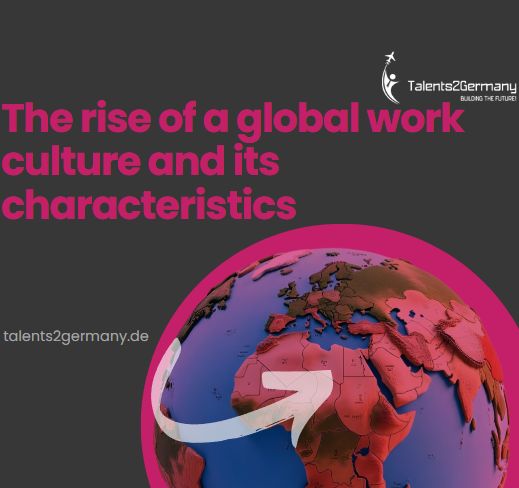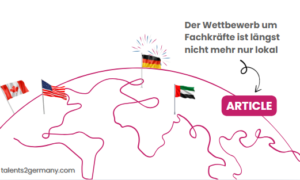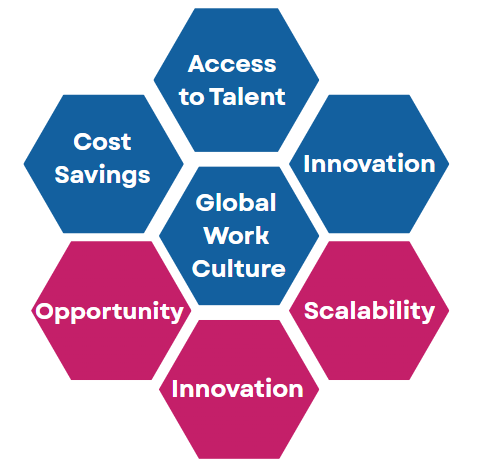
The rise of a global work culture and its characteristics
Have you ever wondered what it truly means to work in a global work culture? Is it just about remote teams and cross-border hiring, or is there something deeper at play?
Global work culture is more than just a trend it’s a fundamental shift in how businesses operate, how employees collaborate, and how leaders manage their teams. It’s a work environment where talent is sourced globally, time zones replace physical borders, and flexibility, digital collaboration, and cultural agility become the new norms.
For decades, German businesses have been defined by precision, hierarchy, and structure—a system that helped build the country’s global economic reputation. But now, this approach is being challenged. German startups can no longer rely solely on local talent or traditional work structures. If they want to scale, they must embrace the reality of a global workforce.
The question isn’t whether German startups should adopt a global work culture—it’s how fast they can adapt before competitors get ahead. This article explores the defining characteristics of global work culture, the advantages for German startups, and the challenges they must overcome to succeed in this new landscape. Let’s dive in!
The characteristics of a global work culture
The modern workplace is no longer confined to office buildings or even a single country. Instead, it operates across time zones, languages, and cultural differences. German startups must adopt new frameworks to attract, retain, and manage top talent worldwide. Here are the defining traits of a global work culture:
Asynchronous communication
- The traditional 9-to-5 workday is a relic of the past, especially in global teams spanning multiple time zones.
- Asynchronous communication—where employees collaborate without needing real-time responses—is replacing constant Zoom calls.
- Tools like Slack, Notion, and Loom allow employees to work efficiently without schedule constraints.
- Example: GitLab, a fully remote company with employees in over 60 countries, relies on detailed documentation rather than live meetings.
Focusing on skills more than location
- In a global work environment, a candidate’s cultural adaptability and communication skills are just as important as their technical expertise.
- Many startups now focus on mission alignment rather than geographical proximity.
- Instead of asking, “Where do you live?” hiring managers should ask, “How do you solve problems in diverse teams?”
- Example: Automattic, the parent company of WordPress, prioritizes skills-based hiring, conducting interviews via text to remove location biases.
Cross-border HR management: Challenge or opportunity?
Hiring across multiple countries means dealing with different tax laws, labor regulations, and compliance risks.
Startups can turn this complexity into an advantage by mastering international employment structures, such as Employer of Record (EOR) solutions.
Companies like Deel and Remote help startups navigate global payroll and compliance without opening international subsidiaries.
Example: German unicorn Celonis expanded globally by leveraging remote hiring platforms instead of establishing offices in every new market.
Multilingual and culturally agile leadership
- The dominance of English in global business is fading, with companies embracing multilingual collaboration.
- Leaders must develop cultural agility—understanding and adapting to different working styles rather than enforcing a single standard.
- Example: Spotify’s “Distributed Agile” model ensures teams can work autonomously while maintaining a shared company culture.
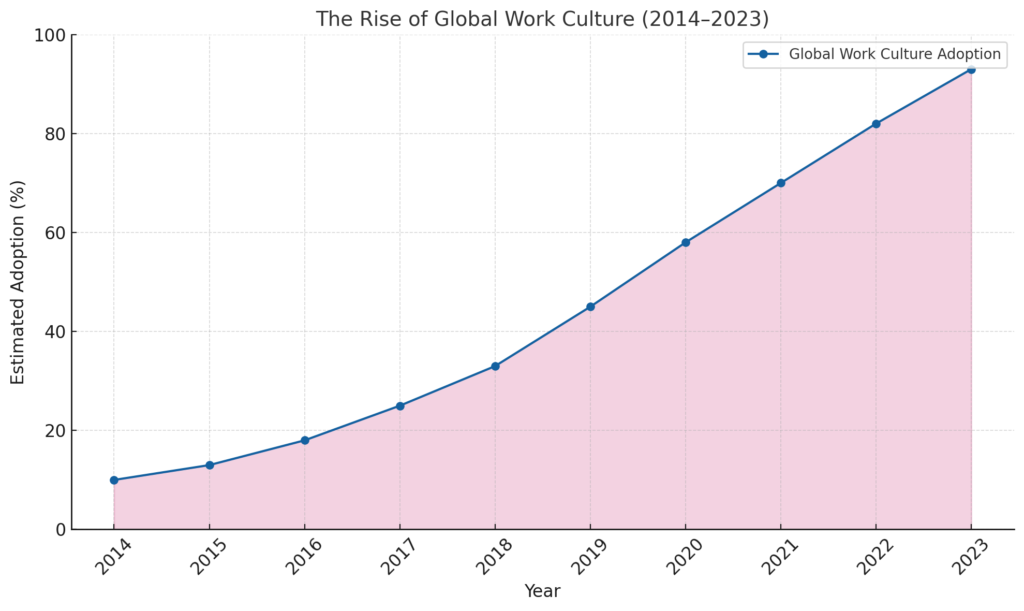
The strategic advantage for German startups
German startups that fully embrace global work culture gain a competitive edge in multiple ways. Beyond cost savings, they unlock talent pools, increase innovation, and bypass bureaucratic restrictions.
Outcompeting big corporations in talent acquisition
- Large German corporations struggle to offer flexible remote work, making startups more attractive to top-tier international talent.
- Startups can leverage global hiring to attract engineers, designers, and marketers from high-talent regions like Eastern Europe, South America, and Southeast Asia.
- Example: Berlin-based N26, a digital bank, scaled internationally by hiring remote-first teams before expanding physical offices.
Bypassing Germany’s rigid labor laws
- Germany’s strict employee protections (e.g., Kündigungsschutz, Betriebsrat) often slow down hiring and firing processes.
- Startups that hire internationally can operate with more agility, using freelance contracts and EOR solutions to bypass excessive regulations.
- Example: German tech companies are increasingly using international contractors for specialized roles instead of full-time local hires.
Success stories: German startups winning with a global mindset
- Personio (HR software): Expanded its workforce across Europe, ensuring diverse perspectives in product development.
- Trade Republic (fintech): Grew its engineering team by hiring top talent from outside Germany without requiring relocation.
- SumUp (payments): Operates in over 30 countries with a remote-friendly policy, reducing costs and increasing scalability.
Overcoming the challenges of a global workforce
While the benefits of a global workforce are clear, startups must also navigate challenges, particularly in compliance, cultural integration, and trust-building.
Navigating compliance and legal hurdles
- German startups hiring internationally must manage tax obligations, employment contracts, and social security requirements across different jurisdictions.
- Solutions:
- Use Employer of Record (EOR) services like Remote.com, Deel, or Oyster.
- Standardize contracts but allow for country-specific adaptations.
- Work with global payroll providers to ensure legal compliance.
Preventing cultural misunderstandings and communication breakdowns
- Remote work eliminates in-person social cues, increasing the risk of miscommunication.
- Strategies for better cross-cultural teamwork:
- Implement structured onboarding programs that teach company values and expectations.
- Foster an open feedback culture with regular pulse checks.
- Use AI-driven translation tools to bridge language gaps in documentation and meetings.
Building trust and loyalty in distributed teams
- The myth that remote workers are less loyal is debunked by research showing they stay longer with companies that offer flexibility.
- German startups can build trust by:
- Offering clear career progression paths for remote employees.
- Encouraging in-person meetups or retreats once a year.
- Providing competitive benefits tailored to different regions (e.g., flexible health insurance).
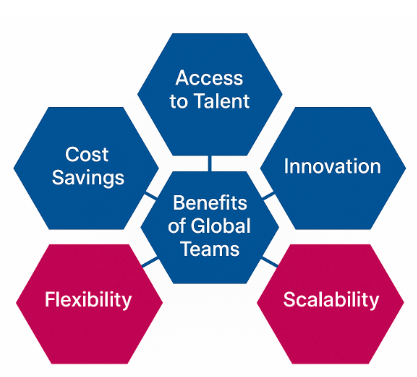
4. How Talents2Germany is helping startups adapt to global work culture?
Talents2Germany is bridging the gap between German startups and global talent by providing:
Tailored recruitment solutions: Helping startups identify and attract top talent beyond Germany’s borders.
Legal and compliance assistance: Navigating work permits, payroll, and contract flexibility for international hires.
Cross-cultural integration programs: Offering training to ensure smoother collaboration between diverse teams.
Remote work infrastructure support: Helping startups implement the right tools and workflows for a distributed workforce.
Networking and community building: Connecting German startups with a global network of remote professionals.
With these solutions, Talents2Germany is enabling German startups to embrace global work culture while avoiding common pitfalls.
5. The Future: What comes next for global work culture?
The global workforce is evolving at an unprecedented pace. German startups that proactively embrace these changes will thrive, while those resisting them risk stagnation.
The end of national hiring policies?
- As companies hire globally, nationality-based work policies will become obsolete.
- New models like “borderless employment” will emerge, where employees can work from anywhere without relocation barriers.
AI-Powered leadership and workforce automation
- AI-driven HR tools will streamline hiring, onboarding, and performance tracking for remote teams.
- Example: AI tools like Deel’s automated compliance platform already simplify international payroll management.
Predictions for the next 5-10 Years
- Hybrid models will dominate, but fully remote teams will become the norm for startups.
- Companies will move from hiring “remote workers” to building “global-first” cultures.
- Governments may introduce new policies to attract digital talent, such as digital nomad visas and remote work incentives.
Conclusion
The rise of a global work culture is no longer a distant concept—it’s the new reality for businesses worldwide. German startups that embrace this shift will gain access to top international talent, increased flexibility, and a competitive edge in scaling their operations. As we’ve explored, characteristics such as asynchronous communication, skills-based hiring, cultural agility, and cross-border HR strategies are defining the modern workplace. Startups like N26, Celonis, and Personio have already leveraged these strategies to thrive on a global scale.
However, this transformation comes with challenges—compliance with international labor laws, cultural integration, and trust-building in remote teams can be complex and overwhelming. This is where Talents2Germany steps in. By providing tailored recruitment, legal, and HR solutions, Talents2Germany helps startups navigate the complexities of a borderless workforce with ease. If your startup is ready to expand globally, attract top talent, and build a high-performing international team, Talents2Germany is your strategic partner.
Take the next step toward global success. Visit us at Talents2Germany today and unlock the power of an international workforce!

